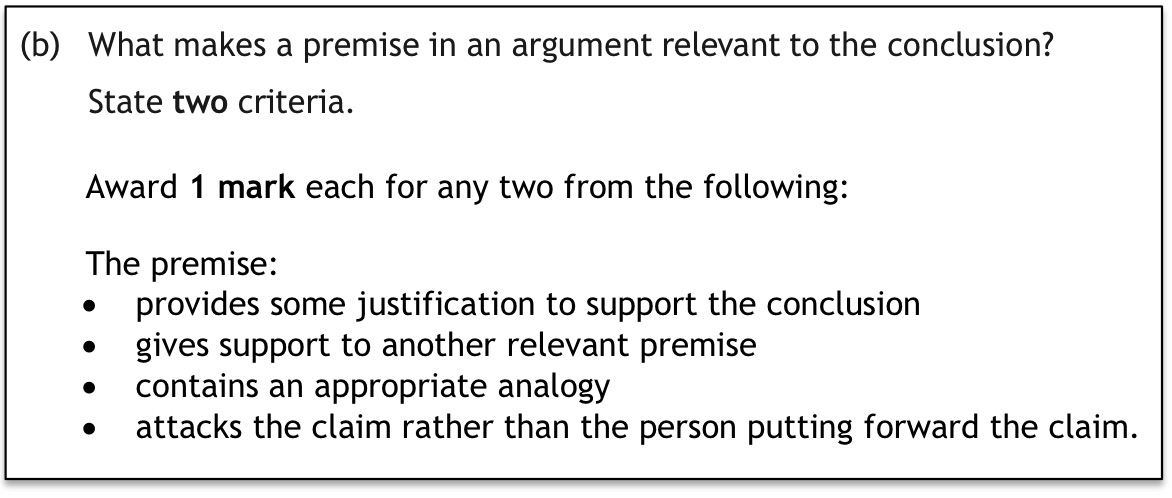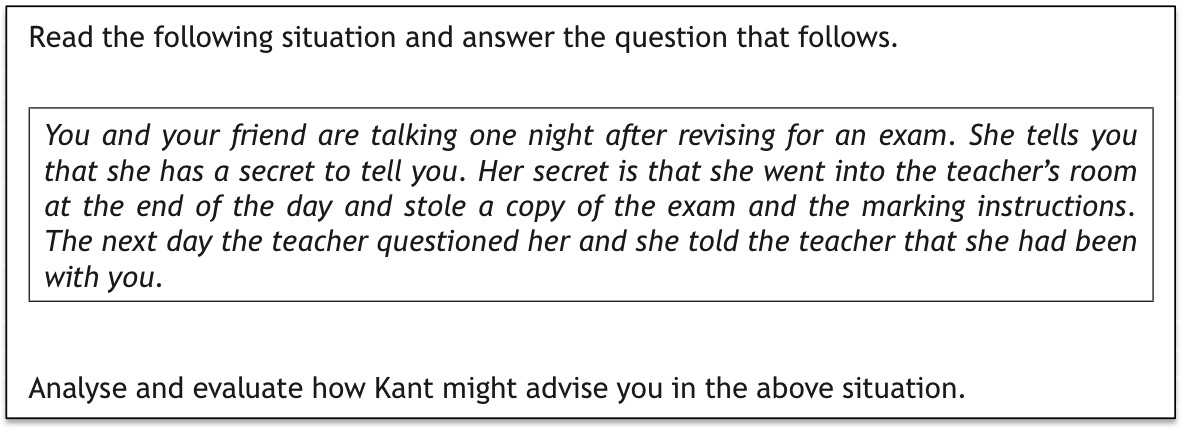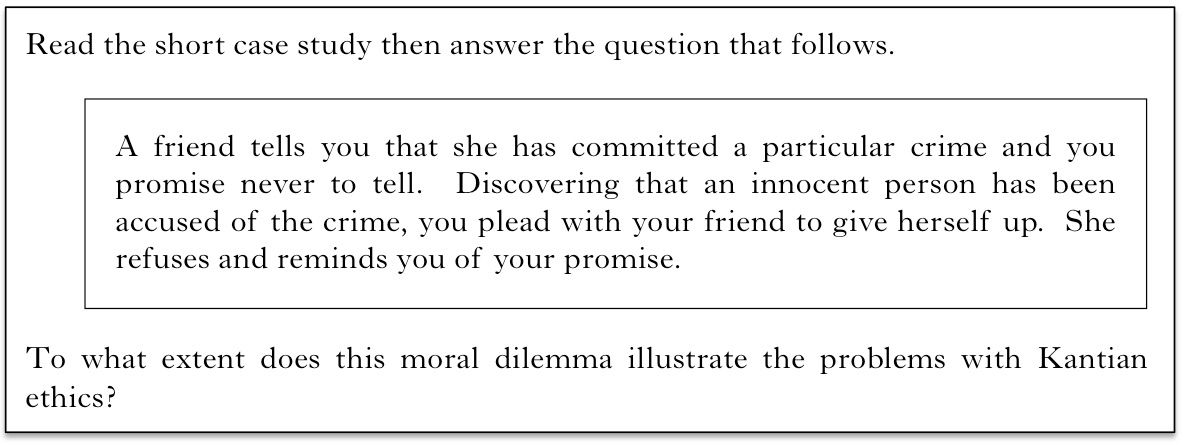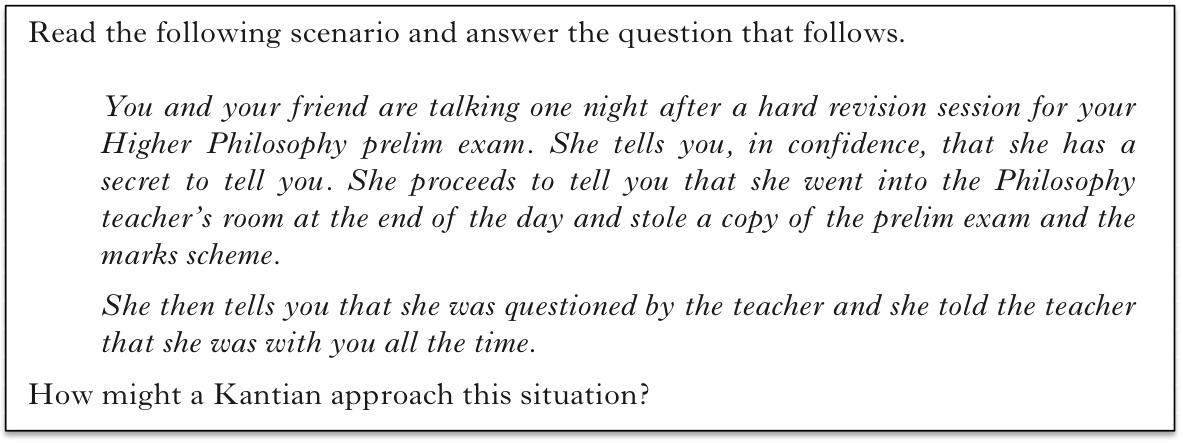Some thoughts on the SQP
This is a good SQP. There may be one or two teaks or words of clarification that might be added in the marking instructions but it is much better than some we have seen in the past.
There are, however, two questions that are worth commenting on:
Question 3b from paper 2

A minor point about this question is that a pupil may well think that this is asking about the argument provided as part of question 3a. If I was using this in a class test I would be tempted to separate them out into two questions and repeat the bit about 'Arguments are often evaluated in terms of...' and somehow emphasise that the answer is looking for what it means for the premises to be relevant to a conclusion. My worry is that an answer might be 'The premise and argument must be talking about the same thing [in this case reproductive systems] and, secondly, the premise and the conclusion must be talking about a particular instance of a group [in this case dogs and animals]'
More problematic are the marking instructions. These have been copied from the Course Specification. To be sure, the first couple of times I read this list of points I didn't see anything amiss but now I'm not so convinced. There are a number of issues.
Firstly, the list seems to equate relevance with support. Technically, I think the list is correct in that premises are intended to support a conclusion and if they do then they will be relevant. However, statements can be relevant even if they count against the conclusion. This is important in that the course now includes conductive arguments which may involve counter-considerations. Whilst these counter-considerations may, strictly, not be premises they are part of the argument. There seems to be rather too much riding on pupils knowing the difference between premises and counter-considerations and I'm not at all convinced that this distinction is sufficiently well-established in the literature that this a reasonable expectation.
The third bullet point about analogies seems fair enough but this is presumably an example of how a premise might fulfil the first bullet point. More problematically this bullet point seems to contain a circularity. It needs to be asked what is meant by an appropriate analogy. Surely this is just another way of saying an analogy that is relevant. One might as well say that a relevant premise is one that contains a relevant statement.
The fourth bullet point is the most problematic. Yes, in an Ad hominem a premise may be saying something irrelevant about a person's character and, therefore, give no support to the conclusion but it doesn't follow from this that a relevant premise will be 'attacking the claim'. It would be more usual to say that it is the whole argument that is attacking the claim.
If this analysis is correct then it is not only the marking instructions but also the Course Specification that needs to be changed. This is probably a one mark question and the Course Specification needs to say something like: 'A premise is relevant to the conclusion if, either by itself or in conjunction with another premise, it gives a reason for believing the conclusion. A counter-consideration is relevant to the conclusion when it gives some reason for rejecting the conclusion.'
Question 2 from paper 1

The first couple of times I read this question I thought. 'Oh, that's fine. It's a question we've had before so no problems.' However, it is important to remember that just because a question has appeared before doesn't mean it is a particularly good question. Sometimes it is only when marking the candidate scripts that problems become evident. Some of the issues with this question are important as now there is going to be a scenario question every year. In fact there have been three variations on this question:
2007

2010

2013

There are a number of things to note about this. It is clear that these are all meant to be variations on the loyalty v. telling the truth dilemma. In over ten years these are the only dilemma questions specifically directed at Kantian ethics. There is clearly going to be a challenge for the question setters to come up with some other kind of scenario question that will enable the candidates to say something else about Kantian ethics. Scenario questions are deceptively tricky to both answer and write. Over the years they have been some of the more problematic questions. The problem for the candidate is that they first have to decode the question and ask themselves what exactly is this question expecting of me, what is relevant and what is not relevant? The problem for the setter is that they also have to have a clear idea of what they are expecting of the candidate and be reasonably confident that the scenario they come up with will be one that the candidate might be reasonably expected to decode in the correct way.
The SQP is clearly reusing the 2013 version of the question which, of the three, is the most problematic. The Course Report that year noted that candidates did reasonably well on the question by relying on pre-prepared answers about Kantian ethics in general but then had difficulties applying that knowledge to the scenario. Perhaps that is not surprising for, unlike the previous variations, in 2013 the dilemma doesn't seem to have been fully set up. One problem with scenario questions is when there is some expectation that the candidate will read extra details into the scenario. When you go down that road you then have to decide what is reasonable to read in and what isn't. It can also lead to a situation where the candidate might have to say. 'Well, if this is the case then the response is this but if something else is the case then the response will be...something else.' This is a particular problem with utilitarianism scenarios which will inevitably be short of the necessary details for any realistic decision to be made. In the 2013 scenario we might wonder if the teacher knew that the paper had been stolen would they have issued a different exam for if they had the worry of an unfair exam is removed from consideration. More importantly there is nothing in the scenario to suggest you are being 'put on the spot' and will have to lie. There are things that might be said. Kant might criticise your friend for stealing the exam and using you as an alibi but this isn't exactly contentious and isn't going to lead to much discussion. Also, in a question like this it isn't clear that it is fair to expect the candidate to think of applying Kantian ethics to the behaviour of the friend when these kinds of scenarios are usually seeking to say what advice would be given to you in this situation. This is made explicit in the SQP and so, despite what is contained in the MIs, there isn't much opportunity in this scenario for talking about the 'not means only' formulation.
Since the truth v. loyalty dilemma hasn't been set up it would seem, contrary to first impressions, that this scenario is really something else. The essence of the scenario would seem to be 'Should you clipe?' A plausible case might be made for saying the Kantian answer to that is 'No'...even if we might suspect Kant would have found a way of coming up with a different answer. Perhaps we are to assume the friend is willing to make the exam paper available in which case the issue might be, 'should you cheat if the opportunity is there?' Either way it isn't obvious that there is much room to expect a Higher candidate to come up with much debate whichever of these interpretations they opt for.
The problem for the marking is what to do about the candidate who answers it as if it were a truth v. loyalty question and engages in lots of analysis and debate when the candidate who interprets the question differently, and arguably more correctly, is excluded from the higher marks because their reading offers less opportunity for debate. Such are the potential pitfalls of scenario questions.